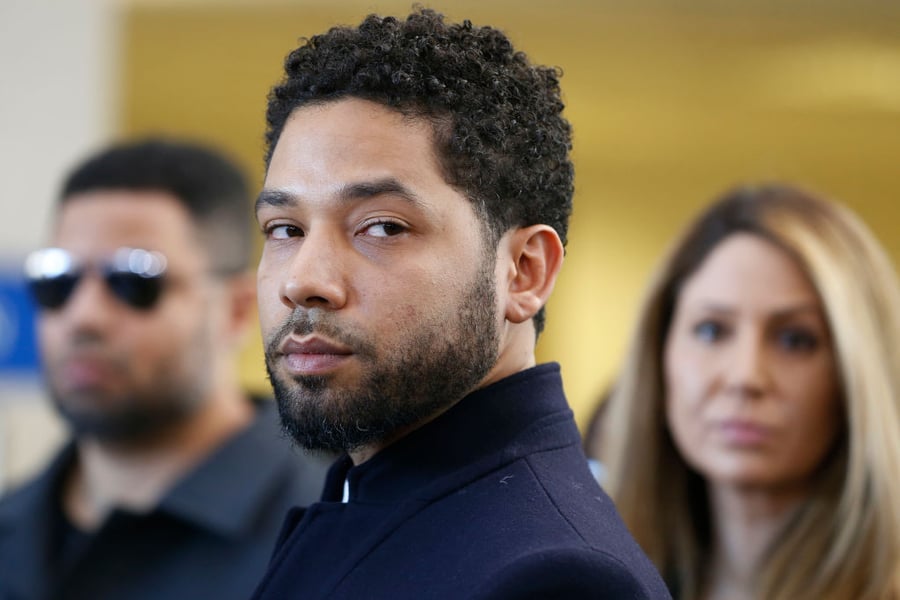Jussie Smollett was sentenced to 150 days in prison and 30 months probation on Thursday after being found guilty in December of lying to police about being the victim of a hate crime. The judge also ordered Smollett to pay the City of Chicago $120,000 and fined him $25,000. During the emotional sentencing, the judge mulled Smollett’s perceived good deeds alongside the actions for which he had been convicted. The judge called the defendant selfish, arrogant and narcissistic during the sentencing. Following the ruling, Smollett declared, “I am not suicidal, I am innocent.”
The disgraced Empire actor was previously charged with six counts of felony disorderly conduct — which is how Illinois law classifies false police reports — for the January 2019 hoax. He was convicted of five of those counts and acquitted on one. Although the charges are class 4 felonies, the least serious in Illinois, they still carried a maximum of three years in prison.
Prior to sentencing, Smollett’s defense team lobbied for a motion to dismiss the charges against him, citing pretrial errors and the installment of a special prosecutor on the case; however, Judge James Linn denied those requests after a lengthy two-hour pre-sentencing hearing.
During the sentencing hearing, Smollett’s legal team called on Empire music supervisor Rich Daniels, friends and family members (including his 92-year-old grandmother) to speak in support of the actor’s character and lobby for probation and community service instead of jail time, as well as read statements from organizations like Black Lives Matter.
The prosecution outlined Smollett’s “calculated plan” to “fake” a hate crime, and then falsely report it to the Chicago Police Department during its argument on Thursday for strict sentencing, adding that what he did should be considered “serious” criminal misconduct rather than it being the “low-level” alleged offense Smollett’s legal team claimed in its argument for leniency. “He’s the one that made a choice that resulted in true hate crimes being denigrated,” the prosecution argued, adding that Smollett’s actions “marginalized” true victims.
In the infamous 2019 incident, Smollett told police he’d been on his way back to his Chicago apartment following a late-night trip to Subway when two men — who Smollett claimed were white — attacked him and beat him up, yelling racist and homophobic slurs and hanging a noose around his neck. News of the hate crime against the Empire actor, who is Black and gay, soon went viral.
In the weeks following the report, Smollett himself became a suspect in the incident, with authorities accusing him of staging the attack himself with help from Nigeria-born brothers Abimbola and Olabinjo Osundairo; the pair later testified that Smollett had paid them to attack him as a publicity stunt. Prosecutors said he’d arranged the attack because he was dissatisfied with the Empire studio’s response to hate mail he’d received while working on the series.
Love Music?
Get your daily dose of everything happening in Australian/New Zealand music and globally.
Despite the evidence — including surveillance video of Smollett and the Osundairo brothers doing a “dry run” practice of the assault — Smollett maintained his innocence. “There was no hoax,” he said on the witness stand. However, the jury still convicted him on five of six charges after a long-delayed trial.
According to ABC 7 Chicago, the actor Samuel L. Jackson and Rev. Jesse Jackson were among those who wrote to the judge asking for leniency in his sentence. “I humbly implore you to please find an alternative to incarceration,” Samuel L. Jackson wrote.
Smollett’s brother Jojo wrote to the judge, “My brother has no criminal record, has been a productive citizen of society. He has given back to so many communities and has touched so many people’s lives and is loved by so many people, as is revealed in the outpouring of support and letters and people have come forth asking for no incarceration.”
Additional reporting by Althea Legaspi
From Rolling Stone US



































